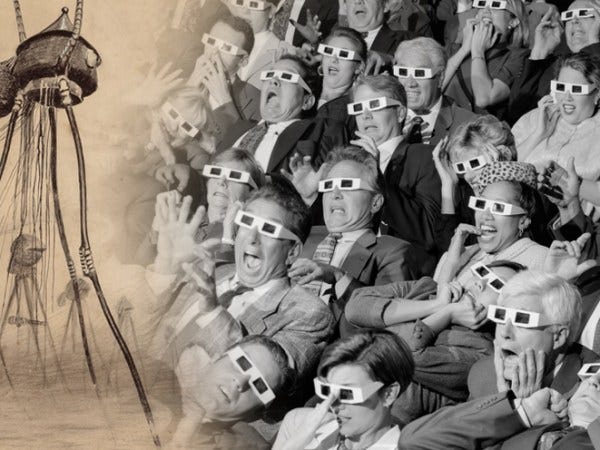Hollywood, Predictive Programming and You: Are We Living in a Science Fiction Movie?
By David Gosselin
It’s one of life’s great ironies that fiction often comes closer to truth than anything else. The latest wire, headline, or speech notwithstanding, the greatest stories handed down to us over generations endure in ways that the typical Hollywood blockbuster or major news headlines rarely can. These stories do so because they capture something immutable and timeless about the nature of man, transcending both the time and space we inhabit. And yet, they are perennial reminders of the revelations awaiting within us daily.
How many other things can we say that about in life?
However, while fiction ironically possesses the magical ability to reveal the transcendent and poetical dimensions hidden beneath everyday reality, another kind exists. Unlike much of the greatest art which serves to shatter illusions and reveal the hidden truth of things (often hiding in plain sight), this art serves to create illusions. Imagine that one day some alien pod crash-landed in the land of timeless stories and fables and began spreading its legs, hatching its brood, and assimilating everything into its own image. Imagine that it began to do all this not by giving anyone orders or telling them what to think or do, but by influencing how they told stories and how they thought about stories—including their own.
After generations, this art ballooned into a vast entertainment industrial complex of storytelling and mythmaking, a modern Tower of Babel, replete with its own celebrity pantheon. From there, it used its growing storytelling industry to expand its reach and the mediums it employed to twist our actual reality. In its stead, it held up to the world the strange reflections of its own darkly enchanted mirror. Of course, these images were not the natural reflections of man created in the unique image of his Creator, but something very different, something curated by its own dark magicians and wizards. Now, imagine that by influencing how we told stories, these new agencies used their magic to fool us into re-imagining our own images, including those of our past, future and very own selves.
Imagine that the result was a magical transformation.
While many might have thought the incantations of these alien wizards and witches to be ineffective, only working on the most gullible, primitive tribes, imagine they actually worked. Indeed, as we’ve already seen in the past, the magical, trance-like qualities of fables, poetry and drama have been an effective means of shaping public opinion for centuries. In fact, Plato recognized the same thing going back to the times of Ancient Greece, where he observed the charming abilities and alchemical-like powers of poets and rhetoricians over the hearts and minds of Greek citizens. After all, the poets were the chief “image-makers” for the Grecian people. From their origin stories, the depiction of gods and the divine to exemplars of virtue and wisdom, Plato recognized that the charms of poets largely shaped the psycho-cosmological matrix of Ancient Greece. These “image-makers” did so by casting their enchanting shadows on the cave walls of Ancient Greek civilization. Of course, the same thing has existed in Persia, Babylon and countless other empires.
However, with the advent of Hollywood and the silver screen, this alchemical tradition of poets and priesthoods took on new magical dimensions. While Plato might not have foreseen exactly what form they would take; their illusive nature was intimated by his own understanding of the intricacies and complex nature of the shadows cast on the cave walls of his own Ancient Greece.
And this is where our story of wizards, magicians, and aliens begins.
The Magicians Strike Back
Fast-forward from the times of Ancient Greece to World War II and post-war America. The industrial revolution has unleashed a flurry of technological miracles, opened the door to an unprecedented world of abundance, and led to the rise of a new middle class confident about its right to have a say in its own nation and future. Such revolutions also seemingly shed a discerning light on earlier and archaic traditions of magic, witchcraft and superstition. Man was finally safe from the dark enchantments, superstitions, and wizardry of previous ages.
Or so he thought?
Enter psychosurgery evangelist Dr. William Sargant.
Sargant has completed his travels after years of profiling various primitive tribes and ancient cultures across the globe, including in Zaire, Haiti, Brazil, Jamaica, and the USA. A friend and correspondent of Aldous Huxley, Sargant undertook his travels in order to understand the seemingly magical transformations individuals experienced at the hands of shamans, priests, magicians and faith healers. Sargant tells the story of how these magicians and storytellers managed to cast their spells and apply their charms across the ages.




